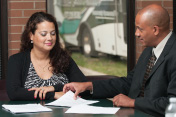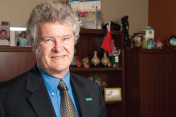Developing Cultural Intelligence
- Nicole S. Dandridge
- Associate Clinical Professor of Law
- Director, Small Business & Nonprofit Clinic
- MSU College of Law
- André B. Dandridge
- Project Manager
- Small Business & Nonprofit Clinic
- MSU College of Law

Student clinicians at the Explore Entrepreneurship International Student Forum, February 2012: Lisa Ferro, Rachel Tutak, Homan Fayhihi-Naraghi, Sheila Terry, Rachel Fox, and Lin-Chi Wang
The Small Business and Nonprofit Clinic (SBNC) at MSU's College of Law has a social justice mission grounded in client-centered lawyering. "There are three main components of the clinic," explained director Nicole Dandridge.
First, SBNC provides direct legal service to small businesses and nonprofit organizations that can't otherwise afford it.
Second, it conducts general community outreach. The clinic offers free seminars on starting a business, obtaining and maintaining tax exempt status for nonprofits, and intellectual property matters such as trademark and copyright. Also, the law students write legal education columns for the Lansing State Journal business section and draft tutorials that are available for free at the clinic and on its website.
The third component is targeted research, policy, and outreach projects. One such project is the Community Economic Development Inclusiveness (CEDI) initiative, which offers legal information and support to local and on-campus entrepreneurs with a specific focus on the Chinese community.
A study conducted in 2011 by U.S. China Creative Space showed that 69 percent of Chinese students surveyed had an interest in starting or investing in a business in the U.S. That interest, coupled with the recent increase of Chinese national students on campus, prompted the clinic to provide heightened outreach to this community. The initiative was funded by a Creating Inclusive Excellence grant from MSU's Office for Inclusion and Intercultural Initiatives.

"We want to give meaningful resources to these entrepreneurs. We have received strong support from the Law College to do this work. We are ready to expand the scope and go out there and do it."
Nicole Dandridge
SBNC Director
SBNC partnered with several university units and community organizations to develop what N. Dandridge calls a "cultural intelligence" curriculum for the law students to take before going out to work with the Chinese entrepreneurs.
"When you're dealing with people who have English as a second language, you have to be very sure that your verbal and written communication is clear," said project manager André Dandridge. "Our expert lecturers this year included two immigration attorneys and one who taught contract negotiation with people from diverse backgrounds. We also pulled in a psychologist who trains university staff that work with incoming Chinese undergraduate students and a representative from the Capital Area Center for Independent Living. The students had the training followed by immediate practical experience in the same semester."
One issue that emerged was the importance of visa status. "We hosted several events for international student entrepreneurs and that was one of the first questions they asked," said A. Dandridge. "We spent a lot of time trying to figure it out."
"It's complex," said N. Dandridge. "We can do what they need in the way of business legal services but we're not immigration attorneys. We're looking at potential strategic partnerships with attorneys that practice both immigration and business law."

"The growth in the number of international students is transforming our campus and community. The talents, life experiences and networks they bring to Greater Lansing are amazing. It is in our best interests to help set up a system in which we strengthen our engagement with each other."
Peter Briggs
Peter Briggs, director of the Office for International Students and Scholars (OISS), pointed out that "the growth in the number of international students is transforming our campus and community. The talents, life experiences and networks they bring to Greater Lansing are amazing. It is in our best interests to help set up a system in which we strengthen our engagement with each other." Laura Wise, who is the student advisor in OISS, added that "while advising international students about their U.S. work authorization options, it quickly became apparent that our students want to know how to start and work for their own business in the U.S. as a professional option. We've been exploring campus and community partnerships to assist us in educating them and the CEDI project has been a natural fit."
A suggestion from Dan Redford, former director of U.S. China Creative Space, to publish the clinic's outreach materials in Mandarin proved to be a turning point. Through Briggs they found a student volunteer for the task, Xiangxi Chen, who signed on for two internship semesters. "Ms. Chen has been great," said N. Dandridge. "She is part of a coalition of Chinese undergraduate students. We co-hosted an entrepreneurship outreach program in February for international students and she played a big part in promoting it."
Chen also found the CEDI project a valuable experience. "In the beginning I felt segregated because I didn't know anybody," she said. "However, people I met in the project were honest, respectful and open-minded when we worked together. I was inspired not just to work on the project, but to really care about the people we were trying to help."
Law student Lu Wang, who assisted with the initial project preparation research, recently translated the clinic's business planning guide into Mandarin. It is already available online in English and Spanish at law.msu. edu/clinics/sbnp/. Wang's experience includes working as an undergraduate in China and translating contracts from Mandarin to English. "My work with CEDI mainly involved reaching out to partners, introducing the project to them, and discussing possible cooperation," he said. "I learned about so many useful resources around us that had not been efficiently utilized. This is something that I would not have found in the classroom."
There is a research component to the CEDI initiative as well. The clinic worked with the Office for Inclusion and Intercultural Initiatives to prepare a survey that assesses the students' cultural intelligence at the beginning of the semester and again at the end, after the training and outreach interaction. "We're still interpreting survey results from last semester, but at first glance we're finding that the training worked," said N. Dandridge. "The students felt more confident after going through it. They felt they had more tools to work with." With this and further data she hopes to co-author an academic article about the project with A. Dandridge.
She also believes the CEDI initiative has some sustainable components that will survive the project's end. "We're right here in the midst of a Big Ten university that has a large international population," she said. "So we want to give meaningful resources to these entrepreneurs. We have received strong support from the Law College to do this work. We are ready to expand the scope and go out there and do it."
Students gain confidence. and insights...
"One lecturer that stood out was Al Swain from Capital Area Center for Independent Living. Al has multiple sclerosis, affecting his ability to see, walk and move. He is sharp, funny and has a great outlook on life. He really touched me. We can't help but live with certain prejudices and stereotypes that we learn growing up, but it doesn't mean that we can't change what we've learned and it doesn't mean that what we've learned is accurate. The biggest takeaway that I gained from Al's presentation is to strive to always be open-minded, never stop learning, and be compassionate toward others no matter what the 'cover' looks like."
Lin-Chi Wang
Vice President
Asian Pacific American Law Student Association
"Taking the cultural intelligence training and being part of the CEDI project helped remind me to slow down and take my time when breaking down legal concepts to clients, especially those for whom English is a second language. It is hard enough for people who do speak English as a first language to grasp complex business or legal concepts. That was one of the fantastic things about the project—jumping right in and giving business and legal counsel to a number of diverse clients who had different levels of business experience and different levels of English proficiency."
Kent Wood
Third-year law student
- Written by Linda Chapel Jackson, University Outreach and Engagement